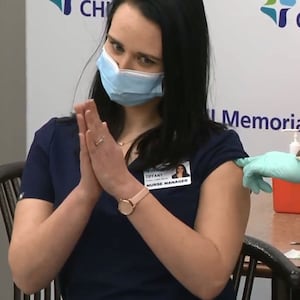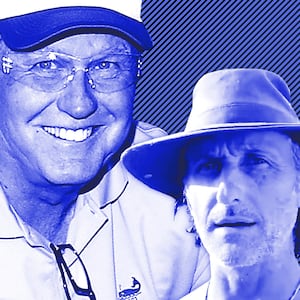Caitlin Murphy, a 31-year old midwife’s assistant and pre-nursing student, once considered herself a hardcore anti-vaxxer. As a kid, she said, she had a rare, severe reaction to the pertussis, or whooping cough, vaccine. The vaccine that caused her reaction was later pulled from the shelves and replaced by the much safer DTaP vaccine, but the memory of the experience seared itself into Murphy’s brain, and she never got over her fear of inoculation.
When her children were born, she defied a firm consensus among scientists and public-health experts that side effects are vanishingly rare, and vowed not to vaccinate them.
“There were no ifs, ands, or buts about it. They wouldn’t be getting any vaccines whatsoever,” Murphy told The Daily Beast.
Murphy’s stance on vaccines was so firm at the time that after becoming pregnant, she said, she had her husband sign an informal agreement that he would never vaccinate their children without her consent.
Due to state vaccination requirements for children entering public school, Murphy, who lives near Albany, New York, did partially vaccinate her own kids, albeit on a delayed schedule. But she refused all vaccines for herself, and continued to refuse to get her kids vaccinated for the flu, chickenpox, and hepatitis B, among others. She still believes vaccine ingredients are inherently dangerous, and that they interfere with “natural” immunity, despite overwhelming scientific evidence that vaccines are safe.
The coronavirus pandemic has complicated her worldview, to say the least.
Murphy, who is immunocompromised, recently began to consider what it would mean for her family if she were to get sick with coronavirus and prove unable to fight it off. Now, she’s gearing herself up to do what would have seemed unthinkable even six months ago: getting the coronavirus vaccine.
“I just have to bite the bullet and do it,” she said.
Until now, many anti-vaxxers and vaccine skeptics in America have had the luxury of refusing vaccines while still avoiding illness. They’ve benefited from herd immunity, the threshold at which enough people are vaccinated against a disease to prevent it from spreading through a population. But with coronavirus, the United States is nowhere near that threshold.
So some anti-vaxxers and vaccine skeptics suddenly find themselves becoming fierce vaccine advocates—even if just for this moment.

People have short-term memories for disease, which has historically tended to feed anti-vaxxer sentiments, according to Emily Brunson, a medical anthropologist at Texas State University. “So many of the diseases vaccines protect against, you don’t see them anymore,” she said. “And so then the risk becomes the vaccine.”
Take rubella, which killed 2,100 newborns and caused 11,000 women to lose their pregnancies between 1964 and 1965, according to the Centers for Disease Control and Prevention (CDC). Or measles, which killed hundreds each year before the vaccine was introduced in 1963. Today, these diseases seem like a distant problem—distant enough that Sierra Dell, a 38-year old who lives in the small town of Ashland, Oregon, decided not to vaccinate her son against them.
“At a time, vaccines were very important,” Dell said. “But you know, the measles, mumps, and rubella vaccine, I didn’t think was necessary.”
It’s worth noting that Ashland is one of the least-vaccinated towns in the country: At a local school, vaccination levels for measles, mumps, and rubella hover as low as 29 percent, according to the Oregon Health Authority. That’s far below the herd immunity thresholds for the diseases these vaccines prevent.
In other words, low enough that these diseases could make a comeback.

The COVID-19 pandemic, in contrast, is glaringly present. Dell plans to get the coronavirus vaccine—although she is not sure when she will qualify. Prior to the pandemic, she worked at a grocery store. In Oregon, as of this week, the vaccine was only officially available to medical workers, people in long-term-care facilities, educators, and childcare providers.
“There are so many people dying. And it’s real.” Dell said. “I choose not to vaccinate at all, in any other way, but this one I’m going for. Because I owe it to society.”
Dell’s also worried for herself in a way she never has been before. Like Murphy, she’s immunocompromised. And she described herself as surrounded by people who don’t believe in the seriousness of the pandemic, who don’t wear masks. She was forced to quit her job at a local grocery store, just to keep herself safe, she said.
“I need to stay here for my kiddo,” Dell said. “I don't want to end up on a ventilator, or dead.”
So she’s become an unlikely champion for the COVID-19 vaccine, commenting on friends’ Facebook posts, correcting the misinformation they share about the coronavirus vaccine.
“It’s [sic] benefits far outweigh it’s risks [sic]. And I am an anti vaxxer. This I won’t mess with,” Dell recently wrote to a friend, who had shared an article about severe allergic reactions to the COVID-19 vaccine, a fixation of conspiracists. Dell has also reached out to former co-workers in response to photos of gatherings for family vacations and holiday meals posted on social media.
Her advocacy has even started causing conflict between her and her childhood best friend, who refuses to get the new vaccine, Dell said.
“Not only does she refuse a vaccine, she won’t wear a mask,” she continued. “I told her I feel it’s selfish.” Dell has shown her statistics on coronavirus deaths to no avail. The rift has made it hard to stay friends. “It makes me lose respect for her.”
Murphy finds herself in a similar position. Lately, she’s become annoyed whenever her friends mention their intention to skip out on the COVID-19 vaccine. They “haven’t walked in the shoes of somebody that is immunocompromised,” she said. “It’s almost like a dose of my own medicine, because I used to talk like that.”
Some anti-vaxxers and vaccine skeptics face worse than rifts in their friendships when they come forward and announce their intention to get a vaccine. Moderators of the Facebook group Vaccine Talk: A Forum for Both Pro and Anti Vaxxers told The Daily Beast that hardcore members of online anti-vaxx communities sometimes face harassment and doxxing when they begin to publicly question their own views. After announcing that she intended to vaccinate her kids, one moderator said that she received death threats and had to involve the police.
Deborah Gordon, a 72-year old functional medicine doctor at a private practice in Ashland, has had more success than Murphy and Dell in swaying people toward getting the COVID-19 vaccine. But she is far from toeing the mainstream scientific line on vaccinations in America.
Gordon actively encourages healthy patients to avoid the flu vaccine and supports parents who choose not to vaccinate, citing risk of vaccine injury from mercury and aluminum in vaccines, she said. These are dubious concerns: Gordon later acknowledged that mercury was removed from most childhood vaccines two decades ago. It’s also important to note that both adults and children absorb far more aluminum from their environment than they do from vaccines, according to The Children’s Hospital of Philadelphia Vaccine Education Center.
Despite her reservations about most vaccines, Gordon—who does not consider herself an anti-vaxxer—said she was encouraging her patients to get this one. She already received her first dose, which she said was her first vaccine, aside from a tetanus booster, in 65 years.
“This is nothing to mess around with—at the very least, because I care about other health-care workers, nurses, and physicians who are just maxed out in intensive care units and emergency rooms and dying,” she told The Daily Beast. Like Dell, Gordon said she closely adheres to social-distancing and mask-wearing guidelines.
When asked about the toll of other vaccine-preventable illnesses, like the flu, Gordon said she evaluates patients on a case-by-case basis. For patients with pre-existing conditions or who interact frequently with individuals vulnerable to severe infection, she recommends vaccination. Pressed further about the importance of herd immunity, Gordon said she might feel differently if she witnessed the effects of diseases like the whooping cough and measles firsthand.

A little over a month ago, Gordon announced her pro-coronavirus vaccine position in a Facebook post. She received plenty of feedback, most of it positive. Friends reached out to her to let her know that they once were hesitant about the new vaccine, but now planned to get it. Gordon suggested she owes the positive reception she’s received to her skeptical stance on vaccines. Those who would otherwise refuse the COVID-19 vaccine might not trust the CDC—but they do trust her.
This contradiction—the willingness to vaccinate against a very present threat but not a more distant one—is understandable, argued Donna Hallas, director of the pediatrics nurse practitioner program at NYU Rory Meyers College of Nursing.
Hallas researches vaccine hesitancy, and has designed an intervention to sway would-be vaccine refusers. People who participated in her intervention, which included information about vaccine safety from accredited sources like the CDC, were more likely to choose to vaccinate their child than those who did not. Key to this intervention, Hallas said, was storytelling—anecdotes about vaccine success stories, images of people suffering from once-common diseases.
With coronavirus, we’re bombarded by stories and images. “It’s a different type of thinking,” Hallas said. “With the [COVID-19] pandemic, it's crystal clear. So many people have died.”
But vaccine hesitancy isn’t a monolith. There is significant overlap between “hardcore” anti-vaxxers and pandemic deniers who claim that the hundreds of thousands of deaths aren’t real. This subset of anti-vaxxers are too far gone. “Nothing’s going to change their minds,” Hallas said.
And just because the decision to vaccinate against a present threat but not a more abstract one is understandable doesn’t make refusing vaccines for other illnesses excusable.

Every year, tens of thousands of people die from the flu, according to the CDC. “Had they taken the vaccine, they would not have died,” Hallas said. “How do you justify that?” And vaccine-preventable diseases are making a comeback. In 2019, 1,282 people became sick with the measles in the largest outbreak in decades. In 2017, there was a whooping cough outbreak in Ashland. (Partially in response to that outbreak, Dell vaccinated her son against whooping cough. “Whooping cough is pretty common around here. And I know that it can be pretty serious,” she said.)
Both Gordon and Dell are choosing to receive the COVID-19 vaccine out of a sense of duty. Dell conceded the contradiction. “I’m not going to pump myself full of vaccines,” she said. But she sees the COVID-19 pandemic as uniquely deadly. “I couldn’t live with myself if I didn’t get the vaccine.”
But do Dell and Gordon feel a sense of duty to protect their communities from other vaccine-preventable diseases? For some of them—chickenpox and mumps, for instance—the answer remains no. With more devastating illnesses, like polio or the measles, it’s a question that gives Dell pause. “That’s tricky,” she said, when asked to consider that vaccines are preventing these diseases from coming back. “A lot of it comes down to fear.”
Dell always thought of vaccines as a personal choice, something you did to protect yourself. Now that she’s seen the devastation wrought by a pandemic, she’s reconsidering—maybe she will be the type of person who vaccinates against the flu in the future, she said. Still, she doesn’t have any regrets about her stance as an anti-vaxxer. She in no way supports mandatory vaccination and does understand the fear of people who refuse to get the COVID-19 vaccine. “People are scared of our government and losing their rights,” she said. “But with half a million dead from this virus, it is a no-brainer for me to get this vaccine.”
Murphy’s had a similar change of heart. The coronavirus pandemic has made her feel vulnerable in a way that no other experience has. She regrets being a part of the anti-vaxx movement, and believes that it contributed in part to hesitancy around the COVID-19 vaccine. “I feel some shame that it took having my immune system compromised to feel this way,” she said. As for those last vaccines her children have not yet received: she says she plans on getting them for her kids when they’re older.
“When I first made my decisions about vaccines, I was a very healthy person,” Murphy said. “It came from a place of privilege.”
As a health-care worker, Murphy already qualifies for the COVID-19 vaccine. Because of her previous reaction, she’s nervous. Still, she’s begun to understand that vaccines, at their most effective, protect the vulnerable—and without group buy-in, they don’t work.
It’s been a difficult year; but it’s been a year of growth, Murphy said: “The coronavirus opened my eyes.”



